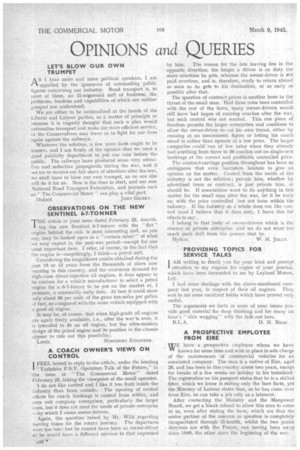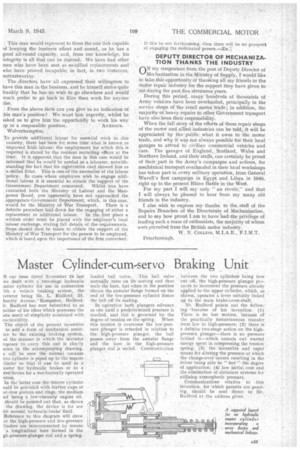OPINIONS and QUERIES LETS BLOW OUR OWN TRUMPET A s I
Page 32

Page 35

If you've noticed an error in this article please click here to report it so we can fix it.
hear more and 'more political speakers. I am appalled by the ignorance of outstanding public figures concerning our industry. Road transport is, to most of them, an ill-organized sort of business, the problems, burdens and capabilities of which are neither grasped nor understood.
We are either to be nationalized at the hands of the . Liberal. and Labour parties, as a matter of principle or because it is vaguely thought that such a plan would rationalize transport and make for more efficient service, or the Conservatives may leave us to fight for our lives again against the railways. Whatever the solution, a few more facts ought to be known, and I am firmly of the opinion that we need a good publicity department to, put our case before the public. The railways have produced some very attractive and seductive propaganda during the -War, and if we are to receive our fair share of attention after the war, we shall have to blow our own trumpet, as no one else will do it for us. Now is the time to start, and our new National Road -Transport Federation, and journals such as " The Commercial Motor " can play a vital part.
Oxford. JOHN GILBEY.
OBSERVATIONS ON THE NEW
SENTINEL6-7-TON NER • THE article in your issue dated February 23, describ
ing the new Sentinel 0-7-tanner with the " flat " engine behind the cab, is most interesting and, as you say, may be looked upon as a "curtain raiser" of what, we may expect in the post-war period—except for one most important item. I refer, of course, to the fact that the engine is—surprisingly, I thinkL-a petrol unit. Considering the magnificent results obtained during the past 10 or 12 years from the thousands of oilers now running in this country, and the enormous demand for high-class direct-injection oil engines,it does appear to be curious for a vehicle manufacturer to select a petrol engine for a 6-7-tonr.or to be put on the market at, I presume, a reasonably early date. At best it could show Drily about 50 per cent. of the gross ton-miles per gallon
fuelnas compared with the same vehicle equipped with a good oil engine. It may be, of course, that when high-grade oil engines are again freely available, i.e., after the war-is over, it is intended to fit an oil engine, but the ultra-modern design of the petrol 'engine and its position in the chassis appear to rule out this possibility. Leeds. NORTHERN ENGINEER.
A COACH OWNER'S VIEWS ON CONTROL
I FEEL bound to reply to the article; under the heading I "Yorkshire P.S.V; Operators Talk of the Future," -in the issue of "The Commercial. Motor" dated February 23, taking the viewpoint of the small operator. I do not like control and I like it less from inside the industry than from outside: The opening of central olfices for coach bookings is control from within, and may suit company enterprises, particularly the larger ones, but it does not meet the needs of private enterprise —by which I mean owrier-drivers. Again, the question -raised by Mr. Wild regarding leaving times for the return journey. The departures were ,too late;. but he cannot have been an owner-driver or he would have a different opinion to that expressed
A30' * • by him. The reason for the late leaving lies in the
opposite direction; the longer a driver is on duty the more overtime he.gets, whereas the owner-driver is itrot paid overtime, and is, therefore, ready to return almost as soon as he gets to his destination, or as early as possible after -that.
The question of contract prices is another hone in the throat of the small man. Had these rates been controlled with the rest of the fares, many owner-drivers would still have had hopes of running coaches after the war, but such control was not wanted. This one piece of freedom permits the larger enterprises and combines to al:ow the owner-driver to cut his own throat, either by running at an uneconomic figure or letting his coach stand in rather than operate at a low price. The larger companies could -run at low rates when they already had anything from three to 20 coaches out on single-seat bookings at the correct and profitable controlled price.
The contract-carriage position throughout has been so ambiguous 'that even barristers hesitate to give an opinion. on the matter. Control from the inside of the industry is not the solution; private hire, whether by advertised tours or contract, is just • private hire, or should be. If associations want to do anSrthing in this matter for the small man after 'the war, let it be truly. so; with the price controlled but not from within the industry. If the indirstry as a whole does not like control (and I believe that it does not), I leave this for' others to say.
I belong to that body of owner-drivers which is the essence of private enterprise, and we do not want too much pack drill from the powers that be,
Hylton. W. H. JOLLY.
PROVIDING TOPICS FOR' SERVICE TALKS
I AM writing to thank you for your kind and prompt attention to my request for copies of your journal, which have been forwarded to me by Leyland Motors, Ltd.•
I had some dealings with the above-mentioned company last year., in respect of their oil engines. They sent to me some excellent bobks which have proved very , useful.
The arguments set forth in some of your issues provide good material for deep thinking and for many an hour's "chin wagging" with the lads out here.
B.L.A. D. H. READ.
A PROSPECTIVE EMPLOYEE FROM EIRE
WE have a. prospectiVe employee whom we have known for some time and wish to place in sole charge of the maintenance of commercial vehicles for an associated company. The man is a native of Eire, aged 28, and has been in this country about two yiears, except for breaks of a few weeks on holiday in his homeland. The registration on his passport states that he is a skilled fitter, which we know is stating only the bare facts, yet the Ministry of Labour states that, as he has come over front Eire, he can take a job only as a labourer.
After contacting the Ministry and the Manpower Board, we get a blank refusal to allow this man to come to us, even after stating the facts; which are that the senior partner of the concern in question is completely incapacitated through ill-health, whilst the two junior directors are with the Forces, one having been away since 1940, the other since the beginning of the war. This man would represent to them the one link capable of keeping the business afloat and sound, as he has a good all-round capacity, and, from our knowledge. his integrity is all that can be desired. We have had other men who have been sent as so-Called replacements and who have proved incapable; in .fact, in two instances, untrustworthy.
The directors have all expressed their willingness to have this man in the business, and he himself states quite [rankly that lie has no wish to go elsewhere and would. much prefer to go back to Eire than work for anyone A:se.
From the above facts can you give us an indication of _his man's poSition? We _want hitt' urgently,' whilst he caked us to give him the oppotturiitY to Work his way ip to a responsible position. • ANXIOLfS. Wolverhampton,
To provide additional labour for essential work in this country, there has been for some time what is known as imported Irish. labour: the employment for which this is required is stated by the resident recruiting officerat the time. It is apparent that the man in this case would be informed that he would be needed as a labourer, notwithstanding the fact that his registration card showed him as a skilled fitter. This is one of the anomalies of the labour 'policy; In cases where employers wish to engage additional labour it is essential to obtain the support of the
Government Department concerned. Whilst you have contacted both the Ministry Of Labour and the Manpower Board, you apparently have not approached the appropriate Governinent Department, which, in this. case, would be the Ministry :of War Transport. There is a definite procedure laid, down for the engaging of either a
replacement or additional labour. In the first place a written order must be placed with .the employer's local labour exchange, stating full details of the requirements. Steps should then be taen to obtain the support of the Ministry of War Transport for the person to be emplayed, which is based upon the importance of the firm concerned. If this be not forthcoming, then there will be no prospect Of engaging the nominated person.—Eia.] DEPUTY DIRECTOR OF MECHANIZATION THANKS THE INDUSTRY ON my resignation from the post of Deputy Director of
Mechanization in the Ministry of Supply, I would like to take this opportunity of thanking all my friends in the Motor repair industry for the support they have given to 'me during the past five strenuous years.
During this period, many hundreds of thousands of Army vehicles have been overhauled, principally in the service shops of the retail motor, trade; in addition, the majority of heavy repairs to other Government transport halie also been their responsibility.
When the full story of the efforts of these repair shops of the motor and allied industries can be told, it will be appreciated by thepublic what it owes to the motor trade, and why it was not -always•possible-for their local garages to .attend to civilian commercial vehicles and tars. The garages of England„ Scotland, Wales and Northern Ireland, and their staffs, can certainly be proud of their .part in the Army's campaigns and actions, for mechanical transport overhauled in their local workshops has taken part in every military operation, from Geheral Wavell's first campaign in Egypt and Libya in 1940,
right Up to the present Rhine Battle in the West. . For my .part I will say only "au revoir," and that I will always be pleased to hear from my many old friends in the industry.
I also wish to express my thanks to the staff of the Repairs 'Branches of the Directorate of Mechanization, and to say how proud I am to have had the privilege of leading such a team of enthusiasts, the majority of whom were ,recruited from the British motor industry.
W. N. COLLINS, M.I.A.E., Peterborough,





















































